Antimicrobials vs. Antibacterials for Brain Fog, Gut Issues, and More
Antimicrobial vs. Antibacterial Use for IBS, Infection, and Brain Fog.
- Antimicrobials vs. Antibacterials|
- Antibiotic Resistance|
- Why Herbal Antimicrobials Work|
- How Herbal Antimicrobials Help|
- Three Steps to Herbal Antimicrobial Use|
- Simplifying Treatment|
- Recommended Products|
Antibacterials and antimicrobials can be key for healing chronic health issues such as irritable bowel disease (IBD,) small intestinal bacterial overgrowth (SIBO,) or H. pylori infections. However, the terms aren’t interchangeable. This article will help you know what antimicrobials and antibacterials are, the differences between antimicrobials vs. antibacterials, how they can treat health conditions, when to use them, and how they are used in functional medicine.

The Difference Between Antimicrobials vs. Antibacterials
Antimicrobials and antibacterials are used in everything from hand soap and hand sanitizer to prescription antibiotics. However commonplace they are, many people don’t understand the differences between antimicrobials vs. antibacterials.
The best way to remember the difference between antimicrobials and antibacterials is that antibacterials are antimicrobials, but not all antimicrobials are antibacterials.
An antimicrobial is anything that kills or prevents the growth of a living organism. [1] There are four types of antimicrobials, and each target a different kind of microorganism [1]:
- Antibiotics (antibacterials): used for bacteria
- Antivirals: target viruses
- Antifungals: target funguses
- Antiprotozoals: target parasites (protozoa)
The term “antibacterial” is commonly used to mean anything that kills off a bacteria or virus. For example, many people refer to Lysol spray as an antibacterial spray, but it is really an antimicrobial product because it will kill bacteria and viruses. It is also helpful to remember that many antimicrobials kill multiple types of pathogens. For example, a common antibiotic, Flagyl, targets bacteria and parasites.

Common Types and Uses of Antimicrobials and Antibacterials
Let’s look at some different types of antimicrobials and what they are used for:
- Antiseptics: used on living organisms (like the skin) to kill various microbes such as bacteria and viruses. Hydrogen peroxide is an antiseptic, and antibacterial soaps are over-the-counter antiseptics that have active ingredients that inhibit bacterial growth.
- Disinfectants: used on non-living surfaces (like countertops and medical supplies) to kill mildew or microbes that may cause infection. Cleaning products like this are technically classified by the environmental protection agency as pesticides, which just means that they have antimicrobial properties and can stop the growth of bacteria.
- Antibiotics: antibiotic agents used to kill bacteria — can be herbal or lab created, such as berberine or penicillin
- Antifungals: used to kill or inhibit overgrowth of fungi, such as oil of oregano, which can be used for yeast (candida) and tinea (which causes Athlete’s foot)
- Antiprotozoals: treat parasites but are called by the issue they treat (ex., antimalarial drugs) rather than “antiprotozoals.”
Since antimicrobials cover such a wide variety of microorganisms, this chart outlines some of the common issues antimicrobials may be used for and what types of microorganisms they are:
| Bacteria | Viruses | Fungi | Protozoa/Parasites |
| SIBO (small intestinal bacterial overgrowth) H. pylori infection (often found in gastritis) Staphylococcus aureus (staph infection) Escherichia coli (E.coli) Salmonella Halitosis (bad breath) | Chickenpox and shingles Herpes virus RSV (respiratory syncytial virus) Coronavirus Influenza (flu) | SIFO (small intestinal fungal overgrowth) Candida (yeast) overgrowth Athlete’s foot Jock itch Tinea versicolor (fungal infection of the skin) | Giardia infection Malaria (caused by Plasmodium) Lyme disease Tapeworm Roundworm |
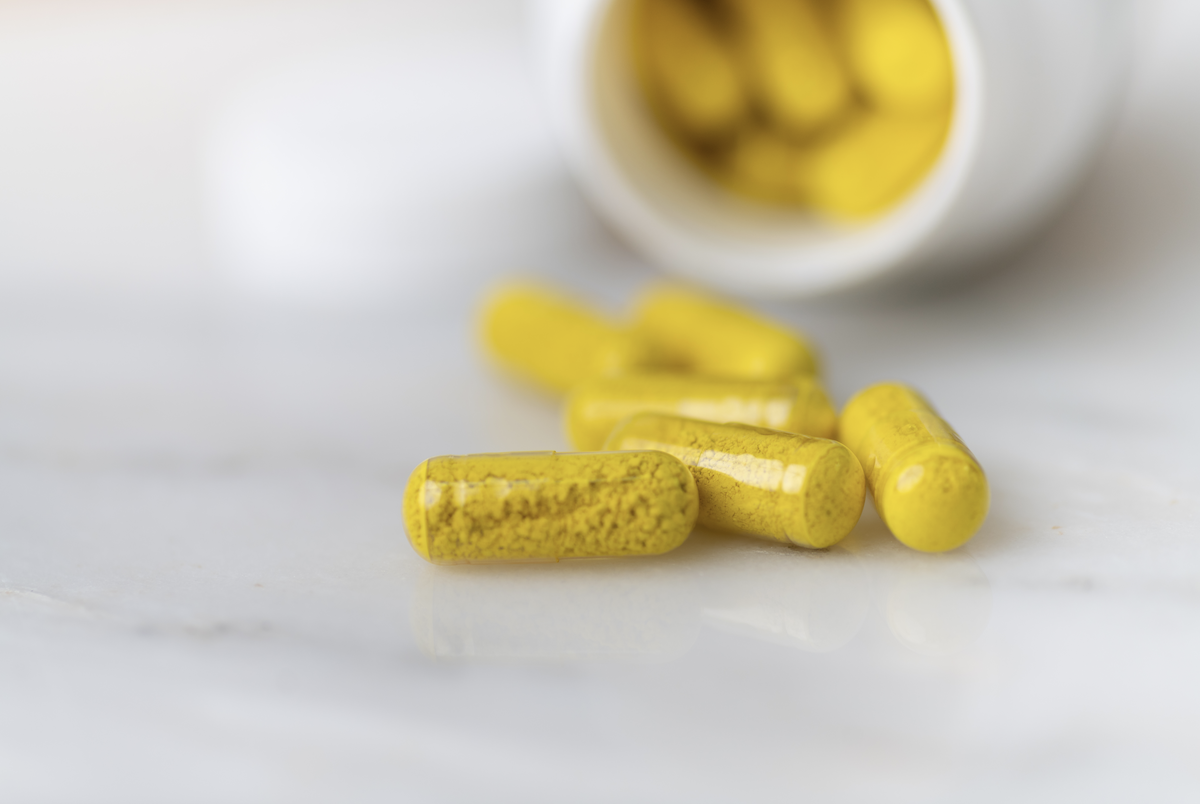
How Herbal Antimicrobials Work
Herbal antimicrobials can be used to treat gut infections (small intestinal bacterial overgrowth (SIBO) SIFO (small intestinal fungal overgrowth), and H. pylori) and the stomach distress and fatigue that come with them. They can also be used as part of a treatment plan for IBD’s such as ulcerative colitis and Crohn’s disease (more on this later). Herbal antimicrobials are often just as effective as lab created antimicrobials but they typically have far fewer side effects. [2, 3]
When many types of plants break down (metabolize) they create either a barrier to microbes or induce antimicrobial agents. Because of these antimicrobial properties, we can use them to treat bacterial infections or overgrowth of bacteria, viruses, and fungi in humans. [4]
Herbal Antimicrobials as Treatment Options
Herbal antimicrobials are often a better choice for treatment because they:
- Have fewer side effects than traditional antibiotics, particularly when dealing with an infection that includes multiple different types of microbes [5]
- Help reduced bacterial resistance [2]
- Have other positive outcomes beyond only killing harmful microorganisms, such as decreasing fatigue, reducing depression, and improving cognition [6, 7, 8]
Let’s look at some of the research behind a few herbal antimicrobials and the conditions they can help treat:
| Condition | Herbal Antimicrobials Used | Supporting Research |
| IBS (irritable bowel syndrome) | Oil of oregano Zataria multiflora Peppermint oil | The compounds thymol and carvacrol in oregano and zataria multiflora improved symptoms, some had up to a 75% reduction. [9] Peppermint oil has been widely tested and shown to improve motility, reduce inflammation, and improve gut microbiota. [10, 11, 12, 13] |
| IBD: Ulcerative colitis and Crohn’s disease | Artemisia absinthium (wormwood, but not sweet wormwood) Curcumin (turmeric) | In colitis and Crohn’s, Artemisia absinthium induced clinical remission. [14, 15, 16] Curcumin is anti-inflammatory and helps maintain remission of colitis. [17] |
| H. pylori infection | Berberine | Adding antimicrobial therapy for H. pylori improves the eradication rate, peptic ulcer healing, and reduced side effects, compared to regular therapy without berberine. [5] |
| Mood and cognitive decline | Berberine Peppermint oil | Berberine may prevent brain damage associated with dementia by reducing metabolic dysfunction. [8] It has also been shown to reduce depression rates. [7] Peppermint oil has been shown to improve the ability to complete cognitive tasks. [18] |
| SIBO | Berberine Pau d’arco (Quercetin) | Herbals used together have been found to be as effective as traditional antibiotics at treating SIBO, and may be particularly helpful in cases where traditional antibiotics have not worked. [19, 20] |
| Insulin resistance | Shirazi thyme (Zataria multiflora) | A randomized control trial showed that thyme decreased blood insulin levels and improved insulin resistance. [21] |
Essential Steps Before Using Antimicrobials

In order to find the least invasive treatment with the least side effects, it’s best to start with resolving gut bacteria imbalances and infections with diet and probiotics. Antimicrobials can be used later if needed.
You can find these three steps in my book, Healthy Gut, Healthy You:
- Reset: Reset your gut with diet and lifestyle changes
- Support: Support the gut with probiotics
- Remove: Remove any unwanted gut bacteria, fungi or parasites with antimicrobial herbs
Let’s take a closer look at each of these steps:
Reset: Anti-Inflammatory, Gut Supportive Diet
An anti-inflammatory diet that removes foods that may cause an immune reaction is the first place to start. Not only may this help reduce symptoms, but the diet may help rebalance the microbiome.
I recommend starting with a Paleo diet, which removes inflammatory foods such as gluten, dairy, and legumes. However, a more restrictive diet may be needed if you do not see enough gut health improvement. For example, the low FODMAP diet (which restricts certain kinds of carbohydrates that feed gut bacteria) can be very helpful for gut support.
Research shows that an anti-inflammatory diet can:
- Reduce gut inflammation, which in turn can resolve imbalances in gut bacteria [22, 23]
- Improve symptoms of IBD [24, 25]
- Reduce the foods that contribute to the bacterial overgrowth in SIBO [26] (combining probiotics, which we talk about below, with an anti-inflammatory diet has been shown to be a powerful treatment for SIBO [27])
Support: Probiotics to Support the Gut Microbiome
Probiotics can help support your gut reset by balancing out the gut microbiome and should be used at the same time as your gut reset:
- One study found probiotics to be more successful than the antibiotic metronidazole in treating SIBO. [28]
- Probiotics support a healthy immune response in the gut as well as reduce gut inflammation. [29, 30, 31, 32]
- Some research shows that probiotics may help prevent or treat viruses, such as upper respiratory tract infections. [33]
Here is a simple chart outlining how to add probiotics into your life:

Probiotic triple-therapy involves using three different classes of probiotic: a blend of lactobacillus and bifidobacterium, saccharomyces boulardii, and soil-based. [34] Meta-analyses show that taking multiple strains of probiotics are more effective than taking a single-strain probiotic. [35, 36]
In order to have the most success with the support step choose one probiotic from each category above in order to get multiple strains.
If these first two steps of reset and support do not resolve symptoms enough, you can move on to the “remove” step. In this step, you can use probiotics along with antimicrobials, which has been shown to be especially beneficial. For example:
- In the treatment of SIBO, probiotics and antibiotics used together increased the effectiveness of treatment [28, 37] and in one study even doubled the effectiveness. [38]
- In treatment for H. pylori, people who took probiotics and antibiotics together had better results than taking only antibiotics. [39]
Remove: Using Antimicrobials to Get Rid of Bad Microbes
If the first two steps do not resolve symptoms, it’s often time to move on to removing any unwanted gut bacteria, fungi, or parasites with antimicrobial herbs.
You may be wondering if testing is needed to know exactly which antimicrobials to take. Herbal antimicrobials are often broad-spectrum, meaning they fight off a few different microbes at once. Using broad spectrum herbal antimicrobials can allow us to resolve the offending microbes, without needing extensive and expensive testing.
Herbal antimicrobials may also help to resolve other chronic health issues, such as IBS, cognitive decline, brain fog, fatigue, and high cholesterol. [8, 40, 41] Antimicrobials may be used in these cases because many of these illnesses have a contributing root cause of a pathogenic infection and/or inflammation. [42]
You may be used to antibiotics being given over 3-10 days, on average. Herbal antimicrobials are given over a longer period of time, often a few months, until you consistently feel better. If after a few months off of the antimicrobials, symptoms come back, another round may be necessary.
Antibiotic Resistance: Are Antibacterials Bad for You?
Overuse of antibiotics (one form of antibacterial) can lead to illness later in life. In fact, one systematic review found the risk of irritable bowel disease (IBD) increased in people who used antibiotics as a child, especially when children were raised in the U.S., where antibiotics are used more often early on in life. [43, 44]
Overuse of antibiotics in healthcare has also led to antibacterial resistance, which is when the microbes (bacteria, viruses, fungi, or parasites) mutate over time or acquire resistance genes, so antimicrobials no longer work against them. [1] This is especially harmful when a microbe becomes resistant to broad-spectrum antibiotics, like in the case of MRSA (Methicillin-resistant Staphylococcus aureus). MRSA is a risk in healthcare facilities where antibiotics are used regularly.
While there are risks, antibiotics have also changed quality of life and greatly reduced mortality from infectious diseases around the world when used correctly.
Fortunately, herbal antimicrobials have demonstrated antibacterial, antifungal, antiviral, antiparasitic, and anti-biofilm properties. They are also anti-inflammatory and preliminary research suggests they may have antidepressant properties. [14, 45] They have fewer side effects than lab-created antibiotics, and they have the diversity to help kill pathogens that have developed drug antibiotic resistance. [2, 3]

Simplifying Your Treatment
If you are experiencing chronic health issues, as mentioned above, and have not found relief, the simplest course of action is:
- Reset the gut with an antiinflammatory diet
- Support the gut with probiotics
If those two steps still do not resolve symptoms, then we can use a broad spectrum mix of herbal antimicrobials. This can be done safely even if we do not know exactly which microbes may be causing symptoms.
I hope this article has helped clear up the confusion of antimicrobials vs. antibacterials and shown you how beneficial antimicrobials can be when used as part of a measured treatment plan. If you need more help figuring out a more personalized treatment plan, apply to become a patient at our clinic.
Dr. Michael Ruscio is a DC, natural health provider, researcher, and clinician. He serves as an Adjunct Professor at the University of Bridgeport and has published numerous papers in scientific journals as well as the book Healthy Gut, Healthy You. He also founded the Ruscio Institute of Functional Health, where he helps patients with a wide range of GI conditions and serves as the Head of Research.➕ References
- Purssell E. Antimicrobials. In: Hood P, Khan E, editors. Understanding pharmacology in nursing practice. Cham: Springer International Publishing; 2020. p. 147–65. DOI: 10.1007/978-3-030-32004-1_6.
- Anand U, Jacobo-Herrera N, Altemimi A, Lakhssassi N. A comprehensive review on medicinal plants as antimicrobial therapeutics: potential avenues of biocompatible drug discovery. Metabolites. 2019 Nov 1;9(11). DOI: 10.3390/metabo9110258. PMID: 31683833. PMCID: PMC6918160.
- Ionescu MI. Are herbal products an alternative to antibiotics? In: Kırmusaoğlu S, editor. Bacterial pathogenesis and antibacterial control. InTech; 2018. DOI: 10.5772/intechopen.72110.
- González-Lamothe R, Mitchell G, Gattuso M, Diarra MS, Malouin F, Bouarab K. Plant antimicrobial agents and their effects on plant and human pathogens. Int J Mol Sci. 2009 Oct;10(8):3400–19. DOI: 10.3390/ijms10083400. PMID: 20111686. PMCID: PMC2812829.
- Hu Q, Peng Z, Li L, Zou X, Xu L, Gong J, et al. The Efficacy of Berberine-Containing Quadruple Therapy on Helicobacter Pylori Eradication in China: A Systematic Review and Meta-Analysis of Randomized Clinical Trials. Front Pharmacol. 2019;10:1694. DOI: 10.3389/fphar.2019.01694. PMID: 32116685. PMCID: PMC7010642.
- Varney E, Buckle J. Effect of inhaled essential oils on mental exhaustion and moderate burnout: a small pilot study. J Altern Complement Med. 2013 Jan;19(1):69–71. DOI: 10.1089/acm.2012.0089. PMID: 23140115.
- Chen C, Tao C, Liu Z, Lu M, Pan Q, Zheng L, et al. A Randomized Clinical Trial of Berberine Hydrochloride in Patients with Diarrhea-Predominant Irritable Bowel Syndrome. Phytother Res. 2015 Nov;29(11):1822–7. DOI: 10.1002/ptr.5475. PMID: 26400188.
- Shinjyo N, Parkinson J, Bell J, Katsuno T, Bligh A. Berberine for prevention of dementia associated with diabetes and its comorbidities: A systematic review. J Integr Med. 2020 Mar;18(2):125–51. DOI: 10.1016/j.joim.2020.01.004. PMID: 32005442.
- Mahboubi M. Therapeutic Potential of Zataria multiflora Boiss in Treatment of Irritable Bowel Syndrome (IBS). J Diet Suppl. 2019;16(1):119–28. DOI: 10.1080/19390211.2017.1409852. PMID: 29333891.
- Hawrelak JA, Wohlmuth H, Pattinson M, Myers SP, Goldenberg JZ, Harnett J, et al. Western herbal medicines in the treatment of irritable bowel syndrome: A systematic review and meta-analysis. Complement Ther Med. 2020 Jan;48:102233. DOI: 10.1016/j.ctim.2019.102233. PMID: 31987249.
- Tan N, Gwee KA, Tack J, Zhang M, Li Y, Chen M, et al. Herbal medicine in the treatment of functional gastrointestinal disorders: A systematic review with meta-analysis. J Gastroenterol Hepatol. 2020 Apr;35(4):544–56. DOI: 10.1111/jgh.14905. PMID: 31674057.
- Black CJ, Yuan Y, Selinger CP, Camilleri M, Quigley EMM, Moayyedi P, et al. Efficacy of soluble fibre, antispasmodic drugs, and gut-brain neuromodulators in irritable bowel syndrome: a systematic review and network meta-analysis. Lancet Gastroenterol Hepatol. 2020;5(2):117–31. DOI: 10.1016/S2468-1253(19)30324-3. PMID: 31859183.
- Mosaffa-Jahromi M, Lankarani KB, Pasalar M, Afsharypuor S, Tamaddon A-M. Efficacy and safety of enteric coated capsules of anise oil to treat irritable bowel syndrome. J Ethnopharmacol. 2016 Dec 24;194:937–46. DOI: 10.1016/j.jep.2016.10.083. PMID: 27815079.
- Rahimi R, Nikfar S, Abdollahi M. Induction of clinical response and remission of inflammatory bowel disease by use of herbal medicines: a meta-analysis. World J Gastroenterol. 2013 Sep 14;19(34):5738–49. DOI: 10.3748/wjg.v19.i34.5738. PMID: 24039370. PMCID: PMC3769914.
- Omer B, Krebs S, Omer H, Noor TO. Steroid-sparing effect of wormwood (Artemisia absinthium) in Crohn’s disease: a double-blind placebo-controlled study. Phytomedicine. 2007 Feb;14(2–3):87–95. DOI: 10.1016/j.phymed.2007.01.001. PMID: 17240130.
- Krebs S, Omer TN, Omer B. Wormwood (Artemisia absinthium) suppresses tumour necrosis factor alpha and accelerates healing in patients with Crohn’s disease – A controlled clinical trial. Phytomedicine. 2010 Apr;17(5):305–9. DOI: 10.1016/j.phymed.2009.10.013. PMID: 19962291.
- Ng SC, Lam YT, Tsoi KKF, Chan FKL, Sung JJY, Wu JCY. Systematic review: the efficacy of herbal therapy in inflammatory bowel disease. Aliment Pharmacol Ther. 2013 Oct;38(8):854–63. DOI: 10.1111/apt.12464. PMID: 23981095.
- Kennedy D, Okello E, Chazot P, Howes M-J, Ohiomokhare S, Jackson P, et al. Volatile Terpenes and Brain Function: Investigation of the Cognitive and Mood Effects of Mentha × Piperita L. Essential Oil with In Vitro Properties Relevant to Central Nervous System Function. Nutrients. 2018 Aug 7;10(8). DOI: 10.3390/nu10081029. PMID: 30087294. PMCID: PMC6116079.
- Chedid V, Dhalla S, Clarke JO, Roland BC, Dunbar KB, Koh J, et al. Herbal therapy is equivalent to rifaximin for the treatment of small intestinal bacterial overgrowth. Glob Adv Health Med. 2014 May;3(3):16–24. DOI: 10.7453/gahmj.2014.019. PMID: 24891990. PMCID: PMC4030608.
- Nickles MA, Hasan A, Shakhbazova A, Wright S, Chambers CJ, Sivamani RK. Alternative treatment approaches to small intestinal bacterial overgrowth: A systematic review. J Altern Complement Med. 2021 Feb;27(2):108–19. DOI: 10.1089/acm.2020.0275. PMID: 33074705.
- Zamani N, Shams M, Nimrouzi M, Zarshenas MM, Abolhasani Foroughi A, Fallahzadeh Abarghooei E, et al. The effects of Zataria multiflora Boiss. (Shirazi thyme) on nonalcoholic fatty liver disease and insulin resistance: A randomized double-blind placebo-controlled clinical trial. Complement Ther Med. 2018 Dec;41:118–23. DOI: 10.1016/j.ctim.2018.09.010. PMID: 30477827.
- Lupp C, Robertson ML, Wickham ME, Sekirov I, Champion OL, Gaynor EC, et al. Host-mediated inflammation disrupts the intestinal microbiota and promotes the overgrowth of Enterobacteriaceae. Cell Host Microbe. 2007 Aug 16;2(2):119–29. DOI: 10.1016/j.chom.2007.06.010. PMID: 18005726.
- Nistal E, Caminero A, Herrán AR, Arias L, Vivas S, de Morales JMR, et al. Differences of small intestinal bacteria populations in adults and children with/without celiac disease: effect of age, gluten diet, and disease. Inflamm Bowel Dis. 2012 Apr;18(4):649–56. DOI: 10.1002/ibd.21830. PMID: 21826768.
- Olendzki BC, Silverstein TD, Persuitte GM, Ma Y, Baldwin KR, Cave D. An anti-inflammatory diet as treatment for inflammatory bowel disease: a case series report. Nutr J. 2014 Jan 16;13:5. DOI: 10.1186/1475-2891-13-5. PMID: 24428901. PMCID: PMC3896778.
- Charlebois A, Rosenfeld G, Bressler B. The impact of dietary interventions on the symptoms of inflammatory bowel disease: A systematic review. Crit Rev Food Sci Nutr. 2016 Jun 10;56(8):1370–8. DOI: 10.1080/10408398.2012.760515. PMID: 25569442.
- Staudacher HM, Whelan K. The low FODMAP diet: recent advances in understanding its mechanisms and efficacy in IBS. Gut. 2017 Aug;66(8):1517–27. DOI: 10.1136/gutjnl-2017-313750. PMID: 28592442.
- Zhong C, Qu C, Wang B, Liang S, Zeng B. Probiotics for Preventing and Treating Small Intestinal Bacterial Overgrowth: A Meta-Analysis and Systematic Review of Current Evidence. J Clin Gastroenterol. 2017 Apr;51(4):300–11. DOI: 10.1097/MCG.0000000000000814. PMID: 28267052.
- Soifer LO, Peralta D, Dima G, Besasso H. [Comparative clinical efficacy of a probiotic vs. an antibiotic in the treatment of patients with intestinal bacterial overgrowth and chronic abdominal functional distension: a pilot study]. Acta Gastroenterol Latinoam. 2010 Dec;40(4):323–7. PMID: 21381407.
- Toribio-Mateas M. Harnessing the power of microbiome assessment tools as part of neuroprotective nutrition and lifestyle medicine interventions. Microorganisms. 2018 Apr 25;6(2). DOI: 10.3390/microorganisms6020035. PMID: 29693607. PMCID: PMC6027349.
- Stenman LK, Lehtinen MJ, Meland N, Christensen JE, Yeung N, Saarinen MT, et al. Probiotic With or Without Fiber Controls Body Fat Mass, Associated With Serum Zonulin, in Overweight and Obese Adults-Randomized Controlled Trial. EBioMedicine. 2016 Nov;13:190–200. DOI: 10.1016/j.ebiom.2016.10.036. PMID: 27810310. PMCID: PMC5264483.
- Leblhuber F, Steiner K, Schuetz B, Fuchs D, Gostner JM. Probiotic Supplementation in Patients with Alzheimer’s Dementia – An Explorative Intervention Study. Curr Alzheimer Res. 2018;15(12):1106–13. DOI: 10.2174/1389200219666180813144834. PMID: 30101706. PMCID: PMC6340155.
- Frei R, Akdis M, O’Mahony L. Prebiotics, probiotics, synbiotics, and the immune system: experimental data and clinical evidence. Curr Opin Gastroenterol. 2015 Mar;31(2):153–8. DOI: 10.1097/MOG.0000000000000151. PMID: 25594887.
- Hao Q, Dong BR, Wu T. Probiotics for preventing acute upper respiratory tract infections. Cochrane Database Syst Rev. 2015 Feb 3;(2):CD006895. DOI: 10.1002/14651858.CD006895.pub3. PMID: 25927096.
- Fleishman MS RDN C. IPA guidelines to qualify a microorganism as probiotic [Internet]. International Probiotics Association. [cited 2021 Jun 1]. Available from: https://internationalprobiotics.org/download/ipa-guidelines-qualify-microorganism-probiotic/
- American College of Gastroenterology Task Force on Irritable Bowel Syndrome, Brandt LJ, Chey WD, Foxx-Orenstein AE, Schiller LR, Schoenfeld PS, et al. An evidence-based position statement on the management of irritable bowel syndrome. Am J Gastroenterol. 2009 Jan;104 Suppl 1:S1-35. DOI: 10.1038/ajg.2008.122. PMID: 19521341.
- Ford AC, Quigley EMM, Lacy BE, Lembo AJ, Saito YA, Schiller LR, et al. Efficacy of prebiotics, probiotics, and synbiotics in irritable bowel syndrome and chronic idiopathic constipation: systematic review and meta-analysis. Am J Gastroenterol. 2014 Oct;109(10):1547–61; quiz 1546, 1562. DOI: 10.1038/ajg.2014.202. PMID: 25070051.
- Greco A, Caviglia GP, Brignolo P, Ribaldone DG, Reggiani S, Sguazzini C, et al. Glucose breath test and Crohn’s disease: Diagnosis of small intestinal bacterial overgrowth and evaluation of therapeutic response. Scand J Gastroenterol. 2015 May 19;50(11):1376–81. DOI: 10.3109/00365521.2015.1050691. PMID: 25990116.
- García-Collinot G, Madrigal-Santillán EO, Martínez-Bencomo MA, Carranza-Muleiro RA, Jara LJ, Vera-Lastra O, et al. Effectiveness of Saccharomyces boulardii and Metronidazole for Small Intestinal Bacterial Overgrowth in Systemic Sclerosis. Dig Dis Sci. 2020;65(4):1134–43. DOI: 10.1007/s10620-019-05830-0. PMID: 31549334.
- Wang F, Feng J, Chen P, Liu X, Ma M, Zhou R, et al. Probiotics in Helicobacter pylori eradication therapy: Systematic review and network meta-analysis. Clin Res Hepatol Gastroenterol. 2017 Sep;41(4):466–75. DOI: 10.1016/j.clinre.2017.04.004. PMID: 28552432.
- Menees SB, Maneerattannaporn M, Kim HM, Chey WD. The efficacy and safety of rifaximin for the irritable bowel syndrome: a systematic review and meta-analysis. Am J Gastroenterol. 2012 Jan;107(1):28–35; quiz 36. DOI: 10.1038/ajg.2011.355. PMID: 22045120.
- Farràs M, Arranz S, Carrión S, Subirana I, Muñoz-Aguayo D, Blanchart G, et al. A Functional Virgin Olive Oil Enriched with Olive Oil and Thyme Phenolic Compounds Improves the Expression of Cholesterol Efflux-Related Genes: A Randomized, Crossover, Controlled Trial. Nutrients. 2019 Jul 26;11(8). DOI: 10.3390/nu11081732. PMID: 31357534. PMCID: PMC6723782.
- Ghoshal UC, Srivastava D, Misra A, Ghoshal U. A proof-of-concept study showing antibiotics to be more effective in irritable bowel syndrome with than without small-intestinal bacterial overgrowth: a randomized, double-blind, placebo-controlled trial. Eur J Gastroenterol Hepatol. 2016 Mar;28(3):281–9. DOI: 10.1097/MEG.0000000000000557. PMID: 26731696.
- Zou Y, Wu L, Xu W, Zhou X, Ye K, Xiong H, et al. Correlation between antibiotic use in childhood and subsequent inflammatory bowel disease: a systematic review and meta-analysis. Scand J Gastroenterol. 2020 Mar 17;55(3):301–11. DOI: 10.1080/00365521.2020.1737882. PMID: 32180472.
- Shaw SY, Blanchard JF, Bernstein CN. Association between the use of antibiotics in the first year of life and pediatric inflammatory bowel disease. Am J Gastroenterol. 2010 Dec;105(12):2687–92. DOI: 10.1038/ajg.2010.398. PMID: 20940708.
- Mechan AO, Fowler A, Seifert N, Rieger H, Wöhrle T, Etheve S, et al. Monoamine reuptake inhibition and mood-enhancing potential of a specified oregano extract. Br J Nutr. 2011 Apr;105(8):1150–63. DOI: 10.1017/S0007114510004940. PMID: 21205415.

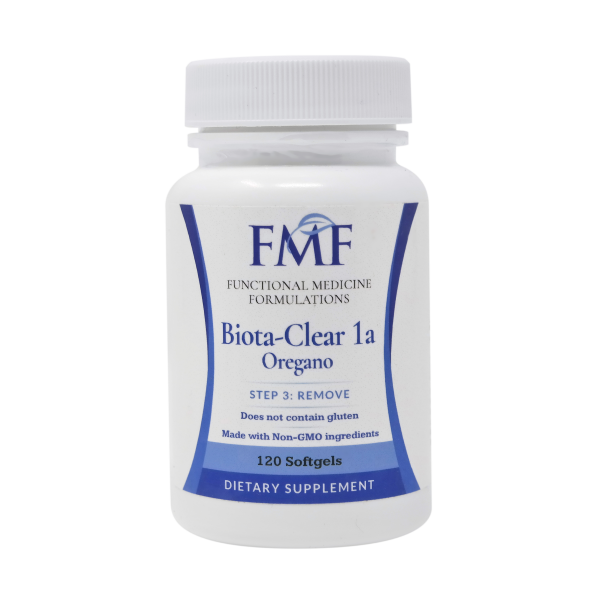
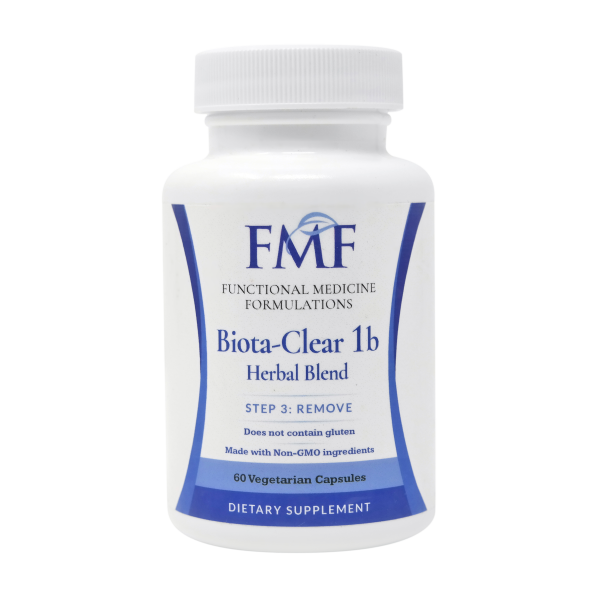
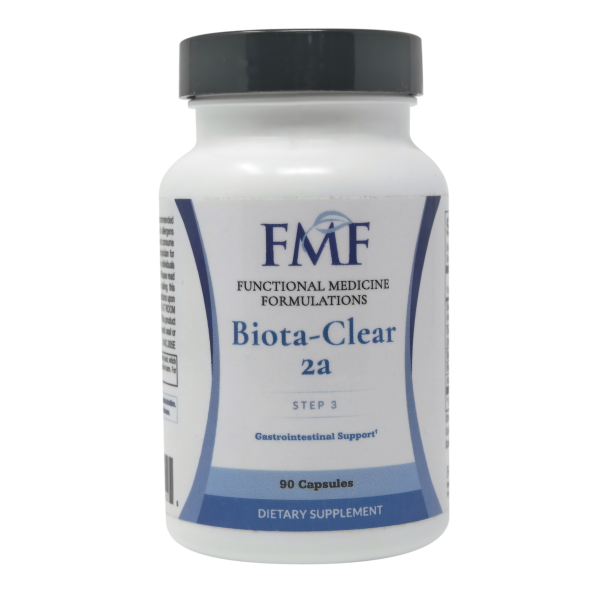
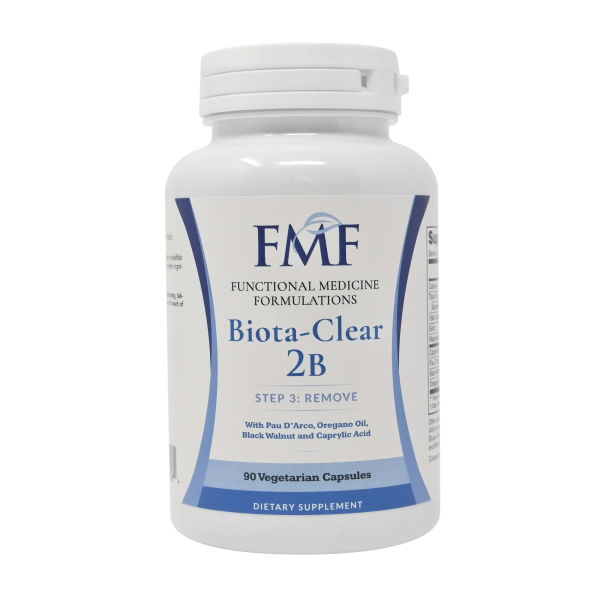
Discussion
I care about answering your questions and sharing my knowledge with you. Leave a comment or connect with me on social media asking any health question you may have and I just might incorporate it into our next listener questions podcast episode just for you!